Here is the moving story of
Regine Böhmer and
Lotte Braun, two Sinti women. On
20 May 1940 they were deported to a forced labour camp in
Belzec. The women were interviewed by
Karin Guth.
Comments and additions by ARC in green.
Lotte Braun:
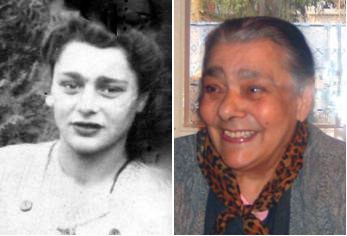 |
| Lotte Braun |
I was born in
Hamburg on
1 October 1927. My father
was
Julius Bamberger, my mother
Berta Bamberger
née Strauss. We lived in the
Marcusstraße. My brother and I were of
school age when my father was arrested in the "July Action" in
1938. Many Gypsies but
also many Jews were arrested. They were all interned in
Sachsenhausen. I was eleven
years old at the time and had to leave school. My mother had to take work in a
factory. And I, being the eldest, had to take care of my brothers and sisters.
And so I had to leave school. I did the housekeeping, cooked and cleaned. We did
not have problems with our neighbours or others. We were not allowed to associate
with other children and they were told not to play with Gypsies. And so we kept to
ourselves. In
1940 we received news from
Sachsenhausen
that my father had died.
In
May 1940 we were deported to
Belzec in Poland.
Until then we had struggled by.
My grandmother and mother were stricter than my father. We feared him less than our
mother. When we returned home late there was hell to pay. We had to be home by a
particular time. At 7 p.m. mother called us in. We had a good father. He worked hard.
He was a docker in the port. Nevertheless, they arrested him in
1938
(
the Nazis stigmatized
the "Gypsies" as being workshy). So being classified as "antisocial" had nothing to do
with working or not. We were not allowed to leave
Hamburg. Travelling was
prohibited.
We were registered as "Gypsies" in our files. And as we were allegedly not "Aryan", we
were deported (
the Nazis categorized Gypsies and Jews as being "non-Aryan" races, and
thereby inferior). We were arrested in the early hours of the morning and taken to a
fruit warehouse in the free port (
the original warehouse no longer exists but today a
memorial erected on a nearby bridge records the action).
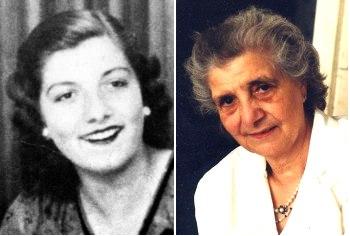 |
| Regine Böhmer |
Regine BŲhmer:
And do you remember what they told us?
LB:
Yes, that we were being taken to Poland where we were to settle.
RB:
And we believed them.
LB:
Yes, we believed it all. My mother, my five brothers and sisters and I were taken
to this warehouse.
RB:
The same thing happened to us. I was born in
Hamburg on
2 February 1932. At 5 a.m.
on
16 May 1940 they took us from our flat in
Nagelsweg in
Hammerbrook
(
Hamburg district). They told my mother to get us dressed and to pack everything we
could carry. They gave us a certain time in which to get ready. We were mother,
father and eight children. My father was
Julius Böhmer and my mother
Emma Böhmer née Stein.
My mother was terribly agitated and repeatedly told us to "Hurry, hurry, hurry."
She packed what was closest to hand. As we left the flat we saw other families
leaving theirs. These were complete families of parents and children. When we arrived
at the fruit warehouse it was already full of people. It was terribly overcrowded but
ever more people arrived. There were definitely hundreds there sitting and lying on
the floor of this huge shed. And each family related the same story. We were to be
given a cottage in Poland. We were to be settled there.
How long were we in this fruit warehouse?
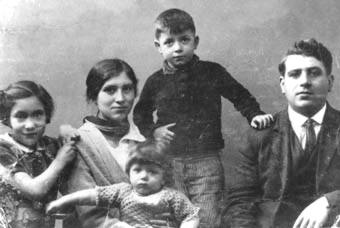 |
| Some Members of Regine Böhmer's Family |
LB:
Two, three days.
RB:
Yes, certainly two days. Each of us was given a number and registered. And it was
terribly overcrowded. We had to sleep on the bare floor. Each sought a place to lie down.
I was quite small being only just eight.
LB:
Each family was registered. All names were registered and those above the age of
fourteen received a number stamped on the arm.
RB:
Then we were given something to eat. This fruit warehouse was situated very close
to the
Hannoversche Goods Station. We had to walk there. We were deported from here.
I no longer know for sure but I think the journey lasted three days. Policemen were
appointed to each goods wagon. They escorted us on the entire journey.
We then arrived in
Belzec. We had to walk quite a distance from the station.
Belzec was not a camp; it was a shed.
LB:
It was a kind of barn or stables. But it was much larger than the fruit warehouse
in the port of
Hamburg. It was encircled with barbed wire. We were all completely
confused and terrified. There was straw on the floor and a stench of horse dung.
Steps led up to a kind of false ceiling of boards. Some of us had to find places above
as there was insufficient room for us all below. This was our accommodation... There
was nothing else. It was only a large empty barn that had probably once been stables.
Again there was much confusion with people milling about. Many had arrived with us
from
Hamburg but also from
Bremen and
Kiel I think. We had to sleep on the straw on
the floor. There were no toilets and we could not properly wash. There was only a
barrel of water.
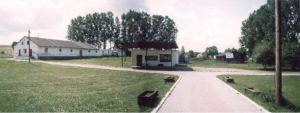 |
| Romany Camp 2003 |
RB:
Many were in fear on the journey. We were uninformed of what awaited us, of our fate,
where we were being taken. We had a sense of foreboding. Nobody could discover anything.
We were ignorant of what had been planned for us. This made us fearful. We had to
sleep on the straw on the floor. We lay very close to each other, the space being very
restricted. The children were screaming and crying. I was also terribly afraid that
I would be separated from my parents and brothers and sisters.
LB:
Next morning the camp commandant confronted us. We all had to line up for roll
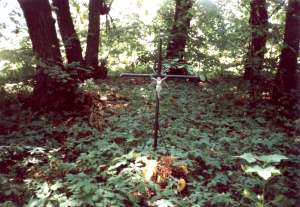 |
| Romany Mass Grave 2003 |
call. I remember to this day how he said: "You are all my prisoners. Those of you who
attempt to escape will be shot like rabid dogs."
I have never forgotten this. Each morning we stood for roll call. We had to lie on
the ground with our noses and mouths in the dirt. The commandant's dog ran among us and when someone
raised their head the dog bit him. It was terrible. I donít wish to think about it again.
We suffered terrible things. From the
Belzec camp we were transported to
Krychow and from there to
Siedlce. We were transported as far as Czechoslovakia, via
Warsaw.
My mother and brother
Rigo were shot before we reached
Warsaw. I donít exactly know
how this happened. I was fetching water when this happened. They were standing beside
the wagon when there was shooting. My mother was shot in the leg and my brother in the
heart. A medical orderly bandaged them both but my brother died the following day.
I had considered taking him with me to fetch water but thought I would be quicker alone.
Had I taken him perhaps he would be alive today. When the train came to a halt somewhere
we buried him. We wrapped him in a blanket and buried him beside the track. He was nine
years old and I was seventeen. This was
1944.
By this time we had suffered four years of being transported from one camp to another.
We were finally transported to
Prague. Everywhere the children had to work.
For example in
Siedlce we had to unload coal from wagons. That was hard work.
RB:
I also had to work. And I was only eight years old.
LB:
My youngest brother was only five. Even he had to work.
RB:
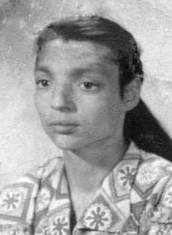 |
| Anni Braun, Lotte's Sister |
Many escaped from
Krychow. The camp was not so closely guarded as
Belzec. My father
tried to persuade my mother to escape but she replied: "I canít. The children will
be shot. I am too afraid." However, my father did not relinquish his plan. My father
escaped with two of my brothers,
Christian aged fifteen and
Robert aged eighteen.
They planned to return to
Hamburg. This was well-intentioned as he thought he
would be able to bring us back to
Hamburg. It did not enter his head that mother
was now left alone with six children.
My father and two brothers succeeded in returning to
Hamburg. They made the journey
on foot from Poland to
Hamburg. He arrived in
Hamburg without identity papers.
An acquaintance denounced him. There were also such people among us. He was re-arrested
and sent to
Sachsenhausen. That was
late 1941.
Initially, my brothers were placed in
a childrenís home from where they were transported to
Auschwitz.
Our lives continued relentlessly on the run, being caught and freed. In
1943 we
were caught again and my brother Reinhold was transported to
Auschwitz.
Robert and
Reinhold died in
Auschwitz.
Christian was transported from
Auschwitz to
Buchenwald
in
August 1944 when the "Gypsy Camp" was liquidated.
Robert and
Reinhold were
among those that remained and who were all killed.
Christian was transported from
Buchenwald to
Dora. And my brother
Rudolf was taken to
Sachsenhausen. He was only
thirteen years old. He was on a transport with 200 children which left for
Bergen-Belsen
but returned to
Sachsenhausen due to an air raid.
Rudolf was liberated from
Sachsenhausen by the Russians in
1945.
Christian and
Rudolf survived and we met
again in
Hamburg after the war.
I was now on the run with my mother, grandmother, my younger sister
Erika who was
only seven years old, and my brothers
Peter (nine) and
Giovanni (five), and my eldest
sister with her son who was around the same age as
Giovanni. We were caught again
and my mother and grandmother were transported to
Majdanek. My grandmother died
in
Warsaw.
For a period of time we were together with
Karl Laubinger, his wife and young son.
They were very good to us. We were now alone with our eldest sister
Hedwig. I was
nine years old. We were constantly on the run until the SS caught us, but we were repeatedly released. I presume
they wanted to avoid the necessity of feeding us. Sometimes farmers allowed us to sleep in their
barns. Having no money with which to buy anything we were forced to beg. The clothes
we were wearing were worn out. We were barefoot. I was often frozen. Finally, in the
summer of 1943, I think it was near
Krakow,
they caught and imprisoned
Hedwig,
Peter, Giovanni, Erika and me again. We were transported to
Ravensbrück
and from there to
Bergen-Belsen.
Bergen-Belsen
was terrible, total confusion reigned.
LB:
Those were terrible times.
RB:
Terrible times! I would take my own life rather than live through that again.
LB:
I couldnít face that again either.
Source: Interview, made by
Karin Guth,
Hamburg
Thanks to
Struan Robertson for translation
© ARC 2005












